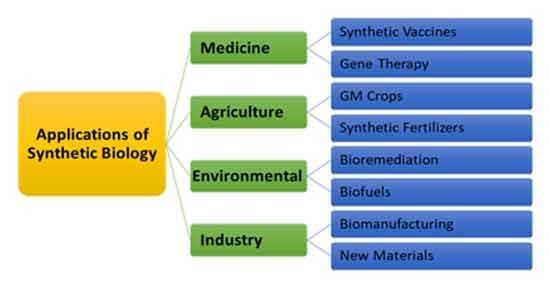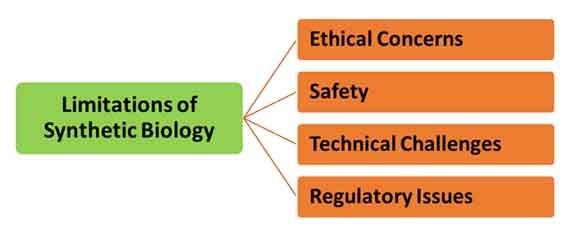Imagine if we could redesign and engineer living organisms to solve some of the world’s biggest problems—like producing clean energy and curing diseases. Welcome to the exciting field of synthetic biology! In this blog post, we’ll understand what is synthetic biology?, explore its applications, discuss its limitations, and peek into what the future might hold. You can download this content as PDF from the link given at the end of the post.
What is Synthetic Biology?
Ø Synthetic biology is an interdisciplinary field that combines biology, engineering, and computer science to design and construct new biological parts, devices, and systems.
Ø It also involves redesigning existing natural biological systems for useful purposes.
Core Concepts of Synthetic Biology
Standardization: Synthetic biology aims to create standardized biological parts (known as BioBricks) that can be easily assembled into more complex systems.
Modularity: Biological systems are broken down into smaller, manageable modules that can be independently designed and tested.
Design and Modeling: Using computer software, scientists can design new genetic circuits and model their behavior before actually building them in the lab.
DNA Synthesis: Advances in DNA synthesis allow scientists to create long strands of DNA from scratch, making it possible to design entirely new genetic sequences.
Applications of Synthetic Biology
1. Medicine
Synthetic Vaccines
Synthetic biology can be used to design vaccines more quickly and efficiently.
Example: During the COVID-19 pandemic, synthetic biology played a role in the rapid development of mRNA vaccines.
Gene Therapy:
Synthetic biology allows for precise editing of genes to treat genetic disorders.
For example, CRISPR-Cas9 technology is being explored to correct mutations in diseases like cystic fibrosis.
2. Agriculture
Genetically Modified Crops:
Crops can be engineered to be more resistant to pests, diseases, and environmental conditions.
For instance, synthetic biology has been used to create drought-resistant crops.
Synthetic Fertilizers:
Researchers are working on engineering bacteria that can naturally fix nitrogen, reducing the need for chemical fertilizers.
3. Environmental Applications
Bioremediation
Synthetic organisms can be designed to break down pollutants in the environment.
For example, bacteria have been engineered to degrade oil spills.
Sustainable Biofuels:
Synthetic biology is being used to produce biofuels from renewable resources, offering a cleaner alternative to fossil fuels.
4. Industry and Materials
Biomanufacturing
Synthetic biology enables the production of complex chemicals and materials.
For example, yeast has been engineered to produce artemisinin, an important anti-malarial drug.
New Materials:
Scientists are creating synthetic spider silk, which is stronger and more flexible than steel, for use in various applications, from clothing to construction.
Limitations of Synthetic Biology
While synthetic biology holds great promise, it also faces several challenges:
Ethical Concerns: The ability to create and modify life raises ethical questions about the extent to which humans should interfere with natural processes.
Safety: There are concerns about the unintended consequences of releasing synthetic organisms into the environment.
Technical Challenges: Despite advances, designing and constructing synthetic biological systems is still complex and sometimes unpredictable.
Regulatory Issues: The field is ahead of regulations, meaning there is a lack of clear guidelines on the use and release of synthetic organisms.
The Future of Synthetic Biology
The future of synthetic biology is incredibly exciting and holds numerous possibilities:
Personalized Medicine: With advancements in synthetic biology, treatments could be tailored to an individual’s genetic makeup, leading to more effective and less harmful therapies.
Artificial Life: Scientists are working towards creating entirely synthetic life forms, which could have applications in medicine, industry, and beyond.
Space Exploration: Synthetic biology could play a role in sustaining human life in space by engineering organisms to produce food, oxygen, and other essentials.
Enhanced Biological Functions: Future research might enable us to enhance the natural abilities of organisms, such as creating plants that can capture more carbon dioxide from the atmosphere.
Conclusion
Synthetic biology is revolutionizing the way we understand and interact with the living world. From medicine to agriculture, environmental conservation to industrial manufacturing, the applications are vast and transformative. While there are challenges to overcome, the potential benefits are immense.
Dear Reader
I hope you found this article on Adaptive Radiation is informative and beneficial. Your feedback and comments would be greatly appreciated. Whether you have suggestions, questions, or thoughts to share, I would be delighted to hear from you. Engaging with your comments helps me continue to produce high-quality content in Biology. Please feel free to leave a comment below. Thank you for your support.
Regards: Admin, EasyBiologyClass
<<< Back to Bioinformatics Notes
| You may also like NOTES in... | ||
|---|---|---|
| BOTANY | BIOCHEMISTRY | MOL. BIOLOGY |
| ZOOLOGY | MICROBIOLOGY | BIOSTATISTICS |
| ECOLOGY | IMMUNOLOGY | BIOTECHNOLOGY |
| GENETICS | EMBRYOLOGY | PHYSIOLOGY |
| EVOLUTION | BIOPHYSICS | BIOINFORMATICS |
Want to read offline? download full PDF here !


